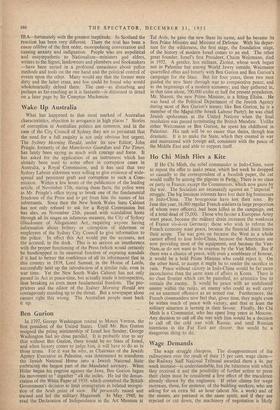Wake Up Australia
What has happened to that most marked of Australian characteristics, objection to arrogance in high places ? Stories of corruption in Australian politics are common, and in the case of the City Council of Sydney they are so persistent that the need for a full enquiry is not only obvious but urgent. The Sydney Morning Herald, under its new Editor, John Pringle, formerly of the Manchester Guardian and The Times, has lately been saying as much with courage and force. It has asked for the application of an instrument which has already been used to some effect in corruption cases in Australia, a Royal Commission, and it has said that two Sydney Labour aldermen were willing to give evidence of wide- spread and persistent graft and corruption to such a Com- mission. Within u few hours of the publication of the leading article, of November 17th, stating these facts, the police were in Mr. Pringle's office trying to break one of the fundamental freedoms of the Press and to get from him the names of his informants. Since then the New South Wales State Cabinet has not only refused to ask for a Royal Commission but has also, on November 25th, passed with scandalous haste through all its stages an infamous measure, the City of Sydney (Disclosure of Allegations) Act, requiring anyone having information about bribery or corruption of aldermen or employees of the Sydney City Council to give information to the police. In effect this Act would put the accusers, not the accused, in the dock. This is so serious an interference with the proper functioning of the Press (which would certainly be handicapped in its essential function of exposing scandals if it had to betray the confidence of all its informants) that in this country in 1939, Lord Samuel, in the House of Lords, successfully held up the introduction of a similar rule, even in war time. Yet the New South Wales Cabinet has not only passed its Act in peace-time, but actually made it retrospective, thus breaking an even more fundamental freedom. The pro- prietors and the editor of the Sydney Morning Herald are courageously standing up to the threat. But a newspaper alone cannot right this wrong. The Australian people must back it up.


































 Previous page
Previous page